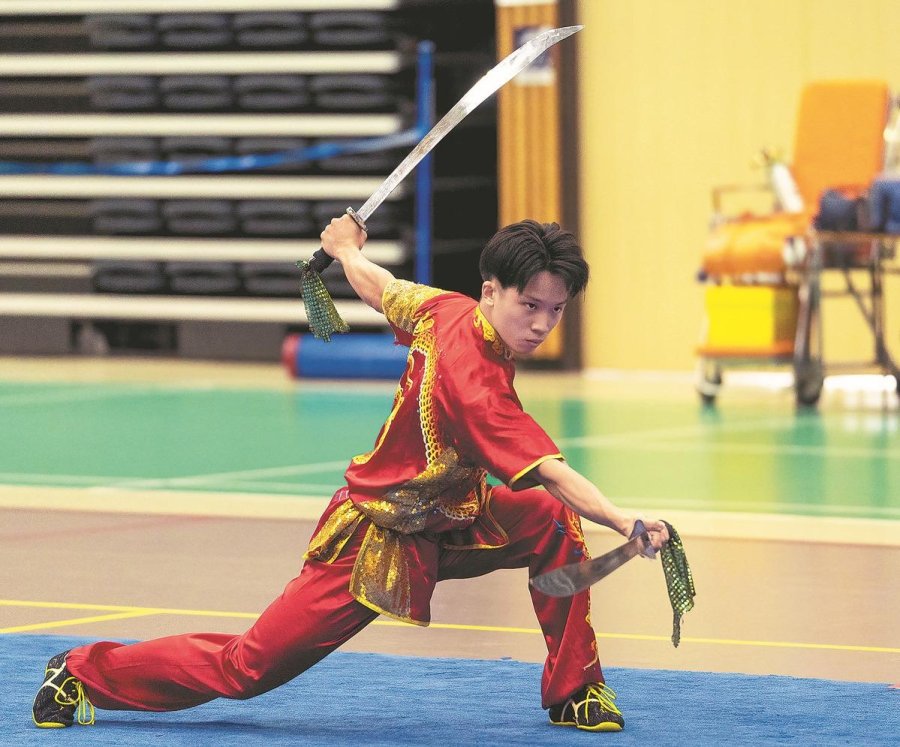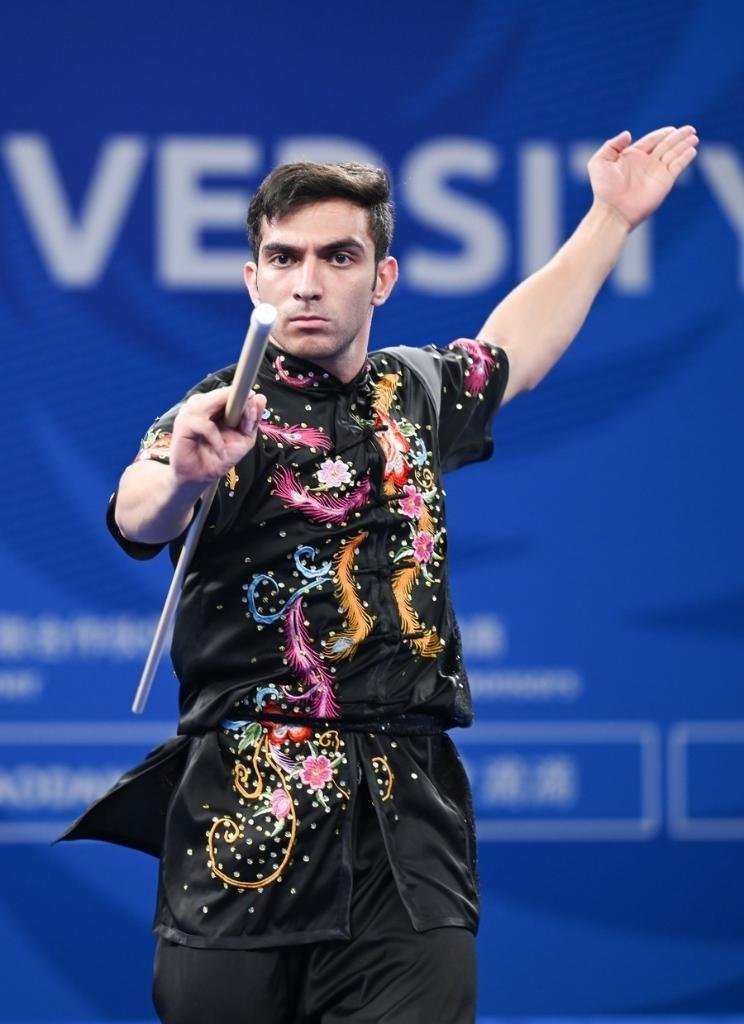
BEIJING (ANN/CHINA DAILY) – The ancient Chinese martial art of wushu has witnessed a surge in popularity among young people worldwide, as they uncover the numerous physical, spiritual, and mental advantages of this sport.
Attracting attention on the international stage, the 31st FISU World University Games commenced in Chengdu, Sichuan province on Friday and will end August 8, welcoming an impressive gathering of 6,500 student-athletes from 113 countries and regions.
Wushu is being featured at the games for the second time, after debuting in the 2017 edition in Taiwan. In 2018, the first FISU World University Wushu Championship was held in Macao, attracting student-athletes from 25 countries and regions.
In 2022, wushu was included as an official sport in the Dakar 2022 Youth Olympic Games.
Wushu has two main categories: taolu (routines competition) and sanda (Chinese kickboxing). Athletes from 31 countries and regions, including the United States, Australia, France, Spain, Brazil, Algeria, Uzbekistan, Turkiye and Iran, are competing for a total of 20 titles in taolu and sanda in Chengdu.
Beatriz Adriao Tustice Silva, Brazilian whushu practitioner
Born and raised in Porto Ferreira in the state of Sao Paulo, Brazil, Beatriz Adriao Tustice Silva is very familiar with wushu.

“I have actually grown up with wushu,” she told China Daily on the sidelines of the Chengdu games. “It is a family business, and all my siblings practice wushu.”
Silva started learning sanda at age 8 under the guidance of her father Antonio, the current head coach of the Brazilian national sanda team who has been teaching for 30 years.
“Wushu is not very popular in Brazil, but thanks to my father, a lot of people in my hometown know about it very well,” she said.
She has four sisters and one brother who all practice sanda, but she is the only one who takes it seriously.
“I think wushu is very cool, and it’s a beautiful art,” said Silva, who participates in two training sessions every day that last from two to four hours. “It teaches you discipline, how to be resilient, how to lose, how to win and how to help people. You will have a strong mind and a strong body if you practice wushu.”
The 23-year-old literature and language major is visiting China for the fourth time. She said that she trained for half a year at Beijing Sport University in 2018, and having exchanges with Chinese peers is important to her.
“Chinese athletes are at a much higher level than us, so I am trying my best to learn from them,” she said.
So far, she has won eight national titles and placed fourth at the 2019 World Wushu Championships in Shanghai.
In Chengdu, Silva will compete in the women’s 60-kilogram sanda. It is her first time participating in the FISU University Games.
“I hope to enter the final and fight against a Chinese athlete,” she said.

Ong Zi Meng, 23, studies sports management at Singapore’s Nanyang Technological University. He learned of the sport at age 10 while participating in wushu activities organized by the school.
“I immediately fell in love with wushu,” he told China Daily in Chengdu.
At that time, he practiced with over 100 children at school. Most of them just did it for fun, but Ong aimed high.
“Since I started learning wushu, I have set a goal to participate in competitions and win medals,” he said.
At 13, he started to train at a local martial arts school. His coach used to compete for the Singaporean national team and later founded a school to promote the sport and other traditional Chinese arts, including Sichuan Opera face changing and Chinese drums.
“There are more and more people learning wushu in Singapore,” he said.
In the future, Ong plans to follow in his coach’s footsteps, aiming to become a wushu coach and promote traditional Chinese arts.
At the Chengdu games, in addition to competing in men’s changquan (long fist) and daoshu (broadsword), he wanted to communicate and exchange with peers from other countries.
“I am curious about how the athletes practice wushu in their countries,” he said. “I just made a friend from France here in Chengdu, and we shared a lot about our training.”
Chinese kung fu stars also play an important role in promoting the sport among young people around the world.
“I love Jackie Chan and Jet Li,” said Oleksii Kolisnyk from Ukraine. “I watch a lot of their movies.”
The 20-year-old student from Pereyaslav-Khmelnitsky State Pedagogical University competed in men’s changquan in Chengdu.
“I have practiced wushu for 15 years,” he said after the competition. “I love this sport, and this sport is in my heart.”

The games provide a platform for young wushu enthusiasts to exchange and communicate.
Kolisnyk said he often practices and exchanges training methods with athletes from other countries, especially China.
“Tai chi brings me closer to Chinese traditional culture, and I am looking forward to demonstrating my passion for wushu, exchanging skills and harvesting friendships,” said Judy Liu, a Chinese-American student-athlete from Stanford University.
She studies physics at Stanford and tries to balance studying and training.
Tai chi brings me closer to Chinese traditional culture, and I am looking forward to demonstrating my passion for wushu, exchanging skills and harvesting friendships.
Judy Liu, a Chinese-American student-athlete from Stanford University
“When I am in school, in addition to studying, I go to the training room to practice, or I ride 50 minutes back to my martial arts gym for training. During the summer vacation, I do research from 9 am to 5 pm, and then the rest of the time is martial arts training and rest,” she said.
Thanks to the rapid development of China in recent years, Chinese culture, especially wushu, is getting attention overseas.
“More and more Japanese youths have become interested in martial arts,” said Kong Xiangdong, Japan’s national martial arts coach and director of the Japanese Martial Arts and Tai Chi Alliance, adding that these youths learned Chinese culture by practicing martial arts.
Kong added that he took young Japanese athletes to the Chengdu games to better understand Chinese culture and martial arts.
“A movement and even a punch can have cultural connotations,” Kong said.
In recent years, wushu has been developing rapidly in Turkiye, with the number of athletes and coaches there growing exponentially.
There are currently more than 140,000 licensed athletes and 4,600 coaches for wushu in Turkiye, with representative offices in 81 provinces, said Ali Tekin, chairman of the education board of the Turkiye Wushu Federation.
Tekin further said it is really important for Turkish athletes to take part in the Chengdu games in China, where wushu was created, and he believes the sport will help improve relations between the two countries.


















































